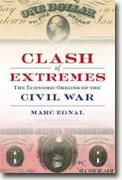Clash of Extremes
Marc Egnal
book reviews:
· general fiction
· chick lit/romance
· sci-fi/fantasy
· graphic novels
· nonfiction
· audio books
· author interviews
· children's books @
curledupkids.com
· DVD reviews @
curledupdvd.com
newsletter
win books
buy online
links
home
for authors
& publishers
for reviewers

 |
Clash of Extremes: The Economic Origins of the Civil War Marc Egnal Hill and Wang Hardcover 432 pages January 2009 |
|
Marc Egnal proposes that economics was more a cause of the American Civil War than was slavery - itself only one of the major aspects of the economic tensions between the North and the South - and that other issues led to the conflict.
The North and the West did not agree on what was more important economically. The West focused on the canals and transportation necessary to get their products to market easier and to receive products from other parts of the country. Some Northerners were invested in the cotton market (which involved lots of slaves) and more concerned with getting cotton to their mills to produce material for clothes and such. These tensions usually played out in politics on the local and national levels. Even within political parties, economics caused problems. At times the Northern Democrats would join the Northern Whig Party to pass bills beneficial to their part of the country in opposition to their Southern party members. Likewise, Southern politicians allied themselves with Northern politicians for their own area’s benefit. The major politicians of the time - Henry Clay, Daniel Webster, John C. Calhoun, and others - represented their geographical districts and economic background in the Congress, working to prevent civil war and any further tension than already existed. Eventually, though, toward the ends of their lives things fell apart, and no one was able to put things back to everyone’s satisfaction – and they decided to fight it out. This fight, the Civil War, changed everything for the United States on various levels, not only the economic but also on social and political levels. Several charts and maps throughout Clash of Extremes Marc Egnal is a professor of history at York University and the author of several books, including A Mighty Empire: The Origins of the American Revolution (1989) and Divergent Paths: How Culture and Institutions Have Shaped North American Growth (1996). Originally published on Curled Up With A Good Book at www.curledup.com. © Br. Benet Exton, O.S.B., 2009 |
|
|
|
 Click here to learn more about this month's sponsor! |
|
| fiction · sf/f · comic books · nonfiction · audio newsletter · free book contest · buy books online review index · links · · authors & publishers reviewers |
|
| site by ELBO Computing Resources, Inc. | |
 Egnal backs up his proposition with research into the various regional economies of the United States from its beginning up to the days of the Civil War. Some of the conflict was between industry (in the North and the West) and agriculture (the South). Even in these parts of the country tension existed over economics in sub-sections, like different areas within particular states. Some of the more northern areas of the South, known as the Border States, were more economically connected to the North than to the lower agricultural South.
Egnal backs up his proposition with research into the various regional economies of the United States from its beginning up to the days of the Civil War. Some of the conflict was between industry (in the North and the West) and agriculture (the South). Even in these parts of the country tension existed over economics in sub-sections, like different areas within particular states. Some of the more northern areas of the South, known as the Border States, were more economically connected to the North than to the lower agricultural South.